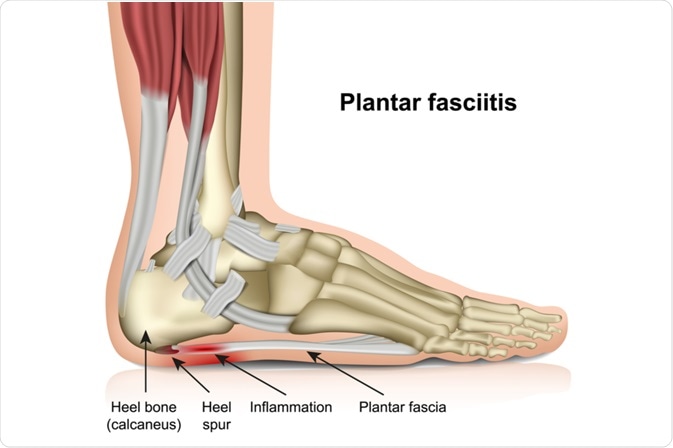Plantar fasciitis is a common foot condition that involves inflammation of the plantar fascia and is characterized by pain in the heel area of the foot.
It is the most common cause of heel pain and approximately 10% of people will be affected by plantar fasciitis at some point in their life. The incidence is higher in women than in men, with individuals between the ages of 40 and 60 years at the highest risk.
Plantar fascia anatomy and physiology

Image Credit: medicalstocks / Shutterstock.com
The plantar fascia is a thick fibrous tissue that extends from the medial tubercle to the transverse ligaments of the metatarsal heads in the foot. There are small nerves in and around the plantar fascia that are responsible for the detection of noxious stimuli and the proliferation of pain messages.
The usual role of the plantar fascia is to provide support to the arch of the foot and help absorb dynamic shock. However, when the tissue is overused or overstretched, inflammation can result. This is thought to arise following several microtears that accumulate to cause symptoms of pain.
Causes
There are several factors that are associated with plantar fasciitis and are thought to be involved in causing the condition, such as:
- Long periods of time standing up
- High-impact sports activities
- Footwear with poor arch support or cushioning
- Overstretching of the sole
There is a high incidence of plantar fasciitis in athletes, particularly runners, due to the level of stress placed on the feet during such activities. It is thought that several small injuries that occur to the plantar fascia often accumulate and cause the gradual onset of the condition.
Symptoms
Pain in the heel or sole of the foot is the most prominent symptom associated with plantar fasciitis. It usually has a gradual onset and increases in severity with time, particularly if the causative activities are continued.
The pain is often worse during activities when weight is placed on the heel of the foot after periods of inactivity. For example, walking in the morning after sleeping in bed throughout the night is most painful and becomes more bearable as the day goes on. However, long periods of standing or walking can worsen the damage and should, therefore, be avoided.
As a result of the pain, some individuals may develop an abnormal gait and begin to limp slightly to reduce the weight load placed on the heel and the pain experienced.
Treatment
Most patients with plantar fasciitis report the complete resolution of symptoms within 12 months of diagnosis with conservative (non-surgical) treatment methods.
Allowing the feet to rest and recover is essential to promote the healing process. In the initial phase, standing up for extended periods of time and walking long distances should be avoided. Instead, keeping the foot elevated as much as possible and applying ice can help to accelerate recovery time.
Exercises to stretch the calf muscles and the plantar fascia can be recommended by a physiotherapist to improve the strength and stability of the muscles. These should be performed several times each day on a regular basis for the best results. Orthoses can also be worn inside the shoe to provide extra support and aid the healing process.
An ice pack can be beneficial to address immediate pain, in addition to simple analgesic medications such as paracetamol or non-steroidal anti-inflammatory drugs (NSAIDs).
Less than 10% of patients will require surgical techniques to address the damage to the plantar fascia and improve symptoms. This is reserved as a last-line therapy, due to the potential risks such as damage to the nerves associated with surgical procedures.
Top 3 Signs Your Foot Pain is Plantar Fasciitis.
Prevention
There are several tips that can help to prevent damage to the plantar fascia, which are particularly useful for people who are at risk of injury to the area. These include:
- Wearing shoes with appropriate arch support and cushioned heels
- Stretching the plantar fascia prior to physical activity
- Regularly practicing exercises or stretches to improve stability
Individuals should be aware that spending long periods of time standing or participating in high-impact sports activities are likely to cause problems. If possible, these activities should be avoided. If these activities are necessary or the individual wishes to continue such activities, appropriate precautions should be taken, such as applying ice following such activities.
Additionally, excessive weight can also increase the risk of being affected by plantar fasciitis. Therefore, losing weight can help to prevent symptoms for individuals who are overweight or obese.
References
Further Reading
Last Updated: Apr 21, 2021